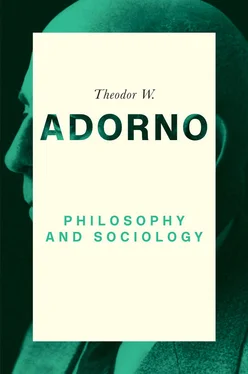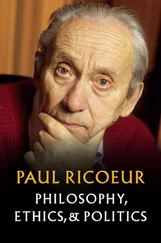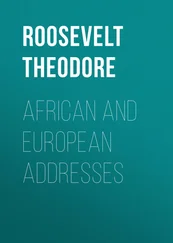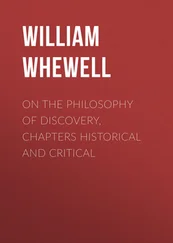Theodor W. Adorno - Philosophy and Sociology - 1960
Здесь есть возможность читать онлайн «Theodor W. Adorno - Philosophy and Sociology - 1960» — ознакомительный отрывок электронной книги совершенно бесплатно, а после прочтения отрывка купить полную версию. В некоторых случаях можно слушать аудио, скачать через торрент в формате fb2 и присутствует краткое содержание. Жанр: unrecognised, на английском языке. Описание произведения, (предисловие) а так же отзывы посетителей доступны на портале библиотеки ЛибКат.
- Название:Philosophy and Sociology: 1960
- Автор:
- Жанр:
- Год:неизвестен
- ISBN:нет данных
- Рейтинг книги:4 / 5. Голосов: 1
-
Избранное:Добавить в избранное
- Отзывы:
-
Ваша оценка:
- 80
- 1
- 2
- 3
- 4
- 5
Philosophy and Sociology: 1960: краткое содержание, описание и аннотация
Предлагаем к чтению аннотацию, описание, краткое содержание или предисловие (зависит от того, что написал сам автор книги «Philosophy and Sociology: 1960»). Если вы не нашли необходимую информацию о книге — напишите в комментариях, мы постараемся отыскать её.
This systematic account on the interconnectedness of philosophy and sociology makes these lectures a timeless reflection on the nature of these disciplines and an excellent introduction to critical theory, the sociological content of which is here outlined in detail by Adorno for the first time.
Philosophy and Sociology: 1960 — читать онлайн ознакомительный отрывок
Ниже представлен текст книги, разбитый по страницам. Система сохранения места последней прочитанной страницы, позволяет с удобством читать онлайн бесплатно книгу «Philosophy and Sociology: 1960», без необходимости каждый раз заново искать на чём Вы остановились. Поставьте закладку, и сможете в любой момент перейти на страницу, на которой закончили чтение.
Интервал:
Закладка:
The pressing need for such reflections lies in the fact, on the one hand, that we constantly come across philosophers who react rather naively to the kind of philosophy that seems interested predominantly in social problems by saying: ‘Yes, but there must still be something like a philosophy which is right!’ The idea of being ‘right’ that is at work here is generally taken over without further ado from a very specific and, I have to say right away, limited notion or conception of philosophy; what is understood specifically by philosophy here is the realm of that which immutably persists, of the purely intellectual or spiritual, of the truth that is detached from all human factors or conditions, even though we do not even bother to ask whether the philosophical tradition itself actually corresponds to this concept of philosophy, let alone to raise the more urgent and more radical question of whether, from the substantive point of view, philosophy should submit to this concept of the supposedly correct or ‘right’ philosophy, a philosophy that we could perhaps best define as one in which absolutely nothing happens that essentially concerns us. On the other hand, we find in the field of sociology that many people, and specifically very many young people, who take up this discipline effectively do so because – as we know from America – this is a promising, evolving, and increasingly popular field of study that also offers all sorts of potential applications across a range of professional contexts. In other words, people believe that they can thereby acquire a number of specific skills and forms of expertise, if I may put it that way, which may bring them academic distinction, or fame, or money, or perhaps just a secure professional position – all fine things in their way which, heaven knows, I certainly do not disdain, and which I would certainly not wish to discourage you from pursuing. 3But, in thinking of sociology as a professionalized discipline in this way, many sociologists are tempted to regard philosophical reflection or investigation as some sort of disturbance or obstruction, like sand that has got into the machinery; so we start racking our brains about how it is possible to know social reality, or about the very concept of society, or about the relationship of static and dynamic factors in society, 4or however we may choose to describe these problems, instead of just learning how to construct a questionnaire or how best to set up relevant ‘interviews’, etc., or whatever it happens to be that is required by the sociology of today, which in this sense could justly be described as an appendage of the economic system. Now I believe that in the context of the following lectures I shall be able to show you that sociology must actually call upon philosophy if it wishes to retain any genuinely scientific character for itself, if it really wishes to be anything more than a mere technique; and indeed I believe that those of you who do decide to study a subject like sociology at university level actually expect something more from such studies than mere technical expertise. Yet the resistance to philosophy that we encounter in sociology is not generally equivalent to the belief that we can evade the issue of scientific status simply by appealing to useful techniques of one kind or another; on the contrary, the resistance in question is given a rational justification and buttressed by claiming a greater scientific character for itself. Thus what is distinctive about this sort of critique of philosophy, if I can put it this way, is that it regards philosophy itself as not scientific at all, but as a field which only introduces something alien, arbitrary, and ultimately insusceptible of proof into the proper questions of social science – in other words, as a kind of ancient relic from the chest that we supposedly like to drag around, especially in Germany, but which actually only obstructs the task of elevating sociology to the level of a genuine science modelled on the procedures of the natural sciences. Now today I would simply like to say, by way of anticipation, that I believe this kind of exaggerated claim to scientific status, when it is specifically contrasted with the philosophical approach to things, is essentially reactive in character. In other words, this claim to scientific status, inasmuch as it refuses to go beyond the identifiably given, 5and repudiates the idea of doing so as essentially ‘unscientific’, thereby reveals an inner tendency to regress to a pre-scientific level, and thus to retreat to what we could basically call the social practice of a reporter; and while there is of course nothing contemptible whatsoever about the task of gathering information and recording facts in the field of the social sciences, this process both presupposes certain theoretical elements and requires, if it is to enjoy any scientific dignity at all, further theoretical interpretation. And in this context, as you will see, the concept of philosophy actually signifies nothing other than precisely that. What I hope to do, in the second part of this series of lectures, later in the semester, is to address this complex, or indeed this conflict, between sociology and philosophy specifically as it presents itself from the side of sociology, and I intend to do so not in merely general or abstract terms but with reference to a current controversy of particular relevance to us here in Germany; it is a controversy that is partly connected with a contribution of my own entitled ‘Sociology and Empirical Research’, 6to which Helmut Schelsky, my colleague from Hamburg, has responded in some detail in his essay ‘The Current Position of German Sociology’, 7as indeed has René König in one of his recent essays. 8I shall try and present something of this controversy to you in due course, including my response to the arguments advanced by my two colleagues, so that you will also get a good idea of what is involved in what one might call my defence of philosophy within sociology itself, with specific reference to an extremely concrete and developed sociological analysis.
But for the moment I would like to begin by introducing, in its most general form, the problem with which we shall be concerned throughout this semester, and indeed from every possible angle. We could perhaps put it this way: in Germany there is a philosophical tradition which – understandably or not so understandably – starts from Kant and which, remarkably enough, has continued specifically within those philosophical schools that originally found themselves in a certain opposition to capitalism, in other words within phenomenology and the existential ontology that developed out of it. This whole intellectual tradition – if I may just present it to you here in summary fashion, in an admittedly highly abbreviated and thus rather undifferentiated way that could give rise to all sorts of misunderstandings – ends up in the following situation. For the sake of clarity I concentrate on Kant here, although the same thing also holds for a great deal of modern philosophy, even if it is expressed there in very different terminology and with different points of emphasis. So, if we just stay with Kant for a moment, we can put the matter this way: the principal task of philosophy, according to Kant, is not to tell us anything directly about the essence of things as such, but to exhibit the possibility of knowledge and to determine the limits of human knowledge. But if philosophy is to exhibit the possibility of knowledge, or, to put this in more precise and specifically Kantian terms, to exhibit the possibility of experience in general, then according to Kant’s argument it cannot presuppose any kind of material content which, for its part, derives from experience but must remain ‘pure’, as Kant puts it. 9‘Pure’ in this sense effectively amounts to reflection on the cognitive function as such – in other words, on something purely intellectual that excludes any reference to real or material factors that might be reflected in this purely intellectual realm, or even form the presupposition of such a purely intellectual realm. In Kant’s philosophy, specifically in the Critique of Pure Reason , this issue takes shape as the problem of what is called ‘constitution’. 10The Critique of Pure Reason is a work that investigates how knowledge is constituted or, in other words, if I can express this once again in a rather abbreviated form, tries to identify the factors or functions through which something like an objective world becomes possible in the first place, and thereby allows insight into the essential connections governing this objective world, whatever it may involve or contain. In the context of this method, however, the objective world itself is regarded as secondary or, in Kant’s terms, as the constituted in relation to the constitutive, 11as that which has been generated or produced over against the purely intellectual and productive principles which make something such as experience in general possible in the first place. And from here the argument then proceeds relatively simply and relatively plausibly: ‘Well, something such as sociology, namely the scientific study of society, or even the sociology of knowledge itself, which investigates the social conditions of consciousness, all this is a kind of knowledge which already moves within the realm of the constituted, the realm of that which has itself been constituted. In other words, the objective world, here society, already belongs to the realm of experience, and the realm of experience itself must be regarded, in accordance with Kantian philosophy, as secondary; the task of investigating it cannot properly belong to philosophy but can only fall to the individual sciences which concern themselves with the relevant field.’ On this line of argument, therefore, philosophy and sociology must appear incompatible with each other, unless we are to engage in a kind of hysteron proteron argument, where first principles are confused with last principles; in other words, knowledge itself would have to be derived from the object to be known, whereas for this whole tradition of thought all material or substantive determinations would already presuppose reflection upon the forms of our cognition or knowledge in general. Now it may perhaps surprise you when I claim that this theoretical outlook, which can generally be regarded as the core element of an idealist philosophical position, is still characteristic, to a very large degree, of so much contemporary philosophy which typically flatters itself for being anti-idealist in character, which constantly assures us, implicitly or explicitly, that it has moved beyond Kant, that it has overcome idealism. Yet I believe that it does not require that much acumen if we consider, for example, the most popular philosophy to have spread within the German universities, namely the so-called existential ontology of Heidegger, to rediscover such lines of thought still at work – albeit through recourse to a much older tradition – under the problematic name of the relationship between ‘being’ and particular ‘beings’, where the latter are supposed to be merely derivative in relation to the former. In the context of Heidegger’s philosophy, ‘being’ is not, heaven forbid, supposed itself to be anything, is not at any cost supposed to be remotely tangible, to be connected with experience or with anything material whatsoever. On the contrary, it is supposed to be that which makes experience in a higher sense possible; or, as Heidegger’s teacher Husserl put it, it is supposed to be available to categorial intuition 12rather than to discursive or scientific concepts of any kind. 13And over against this so-called knowledge of being, any substantive social knowledge, and especially any attempt at social self-reflection, can appear only as a kind of Fall, as a recourse to something secondary, whereas the task is precisely to return to what is first, namely to the concept of being. I may note in passing that I have just drawn your attention, with reference to one small specific model only, to a relationship between idealism and modern existential ontology which I nonetheless believe is of far greater relevance and significance than might initially appear. I believe that it is possible, and indeed even obligatory, to offer a detailed critique of contemporary existential ontology that will show how it is actually an idealism malgré lui-même , or, in other words, an unwittingly covert and thus, if I may put it in this way, miscarried form of idealism. 14But I do not wish to elaborate on this today, as perhaps I shall have an opportunity in the next semester to look at these particular problems in more detail. 15This opposition between philosophy and sociology also crops up in the context of the seemingly concrete theorems of contemporary existential ontology, as we can clearly see from certain remarks of Herr Heidegger from the pre-fascist era, when he once compared the sociologist to someone who just clambers up the façade of a building – the proud edifice of philosophy – and forces his way into the sacred precincts, only to make off with all of its splendid furnishings, 16as Richard Wagner would put it. 17This is basically the same kind of argument to be found in Kant as far as the relation to the empirical realm is concerned, except that Kant, with typically unerring and admirable honesty, proceeded far more gently in relation to psychology, which is something from which he similarly tried to distance himself in his own time, just as existential philosophy tried to distance itself from sociology in ours. When you read Kant, of course, you will find nothing regarding sociology in the sense in which we use the word. Incidentally, I would just like to point out here, if you want to get a good general idea of what is commonly understood by sociology, at least in Germany, that the Mohr publishing house has just issued a reprint of the short introduction to Max Weber’s Economy and Society , which includes discussion of a range of basic sociological concepts. 18I would strongly recommend all of you, if you can, to take a look at this little text. Although I myself do not share the specific conception of sociology that is defended here, I think the introduction to Economy and Society will provide an excellent starting point for those who would like to know – those of you who do not yet know – exactly what we mean when we talk about sociology.
Читать дальшеИнтервал:
Закладка:
Похожие книги на «Philosophy and Sociology: 1960»
Представляем Вашему вниманию похожие книги на «Philosophy and Sociology: 1960» списком для выбора. Мы отобрали схожую по названию и смыслу литературу в надежде предоставить читателям больше вариантов отыскать новые, интересные, ещё непрочитанные произведения.
Обсуждение, отзывы о книге «Philosophy and Sociology: 1960» и просто собственные мнения читателей. Оставьте ваши комментарии, напишите, что Вы думаете о произведении, его смысле или главных героях. Укажите что конкретно понравилось, а что нет, и почему Вы так считаете.












